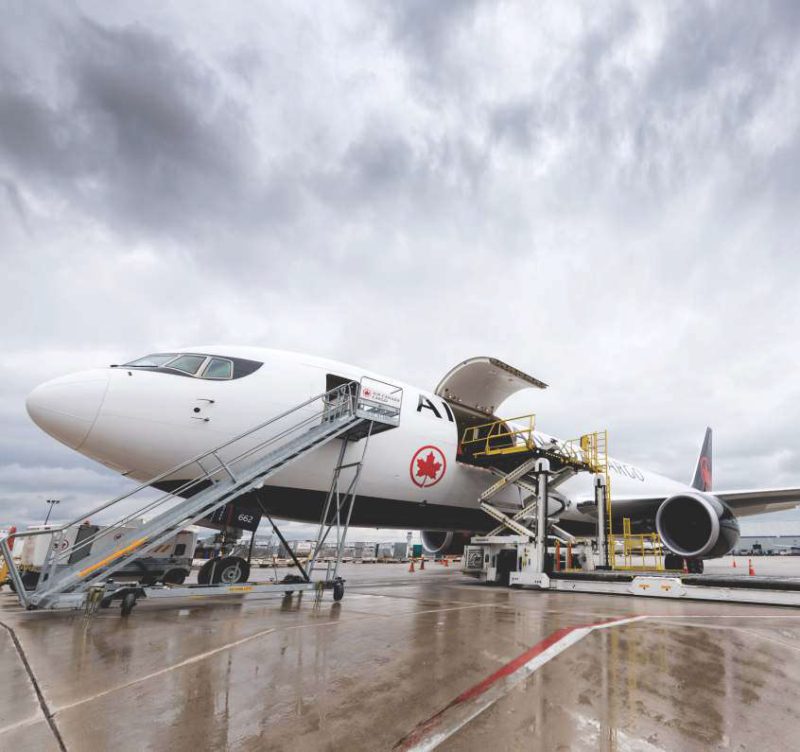Frozen Frontiers: Defining tomorrow's cool chain standards in air cargo logistics
The transportation of temperature-sensitive items is a vital symphony within the larger orchestration of air freight logistics in the complicated movement of global commerce. The Cool Chain, a precisely orchestrated sequence ensuring the safe transport of pharmaceuticals and perishable items, has undergone a dramatic evolution highlighted by technical advances, increased regulatory standards, and industry collaboration.
Air Cargo Update explored the inner workings of this intricate network, seeking insights from three renowned individuals who are defining the future of the air cargo sector. Fabrice Panza, Etihad Cargo’s Manager of Global Cool Chain Solutions, Daniela Vial, Latam Cargo’s VP of Product Development, and Matthieu Casey, Air Canada Cargo’s Managing Director, Commercial.
With the global demand for the safe and efficient transportation of goods that are sensitive to temperature, these cargo executives provide insight into the tactics, advancements, and difficulties that characterize the Cool Chain industry.
Their collective wealth of experience and leadership within prominent air cargo organizations positions them as flag bearers steering the industry toward a future where the Cool Chain not only meets current demands but anticipates and addresses the evolving complexities of a dynamic global market.
Etihad Cargo: Fabrice Panza, Manager Global Cool Chain Solutions
Fabrice Panza, Manager of Global Cool Chain Solutions at Etihad Cargo, articulates the airline’s unwavering commitment to ensuring the integrity of temperature-sensitive cargo.
“Our commitment is precisely why we sought out and achieved the International Air Transport Association (IATA)’s Center of Excellence for Independent Validators (CEIV) Pharma certification. This certification and its stringent requirements for quality assurance and quality management are fundamental to our operations and commercial activities,” asserted Panza.
In emphasizing the significance of the CEIV Pharma certification, Panza extends the benefits beyond the carrier to Etihad Cargo’s customers. He states, “Through our dedicated Cargo Pharma management team, we constantly monitor and analyze the quality and safety of Etihad Cargo’s PharmaLife product performance. We demonstrate a high level of attention to standards and the safe transportation of pharmaceuticals across the entire organization. Pharmaceuticals are identified as a critical product within our operations and commercial activities.”
Highlighting the comprehensive nature of their commitment, Panza details that CEIV Pharma Certification extends to cargo handling and warehousing at Abu Dhabi International Airport (AUH).
Etihad Cargo’s vision includes a multi-phased cargo infrastructure development strategy, featuring an expanded pharma facility and the establishment of a Cool Chain Centre of Excellence at their UAE hub.
Panza underscores the importance of investing extensively in training, acknowledging that highly trained staff are essential to maintaining quality throughout the pharmaceuticals’ entire journey.
Panza provides a nuanced view of the enhancements made to Etihad Cargo’s IATA CEIV Pharma-certified PharmaLife product. He says, “We have enhanced Etihad Cargo’s PharmaLife product to meet not only the pharmaceutical transportation challenges of today but also the life sciences challenges of tomorrow. We offer two main solutions: open cool chain and closed cool chain. Whether transporting temperature-sensitive cargo via active and hybrid containers as premium products or via customers’ passive autonomous packing, Etihad Cargo offers specialized handling and transportation solutions to ensure the safe and efficient transportation of pharmaceuticals.”
Technologies and Innovations in Cool Chain Logistics
Etihad Cargo’s commitment to innovation is evident in its continuous enhancement of the PharmaLife product through technology. Panza shares insights into their pivotal role in establishing Pharma Corridor 2.0 between Abu Dhabi and Brussels. He says, “The main objective of this project is to provide the highest levels of assurance in the quality of handling to pharmaceutical shippers and forwarders through the establishment of pharma corridors between airports with cargo handling communities certified under the IATA CEIV Pharma program.”
Collaborating closely with government bodies, including the Department of Health and Abu Dhabi Customs, and industry associations like Abu Dhabi Airports Company, Brussels Airport Company, and Pharma.Aero, Panza emphasizes the importance of reliable data. He notes, “Reliable data, and the ability to freely share this data, will enable every stakeholder to track shipments in real-time and react dynamically as and when required.”
Discussing the impact of the Pharma Corridor initiative, Panza provides impressive statistics. “Through this first-of-its-kind pharma corridor, Etihad Cargo has already shipped 71 percent more pharmaceutical and life sciences cargo volumes than before its creation. This ensured the smooth and efficient delivery of more than 1,900 tons of medicines and treatments to those in need across more than 32 countries.”
Panza also details Etihad Cargo’s active contribution to Pharma.Aero’s pharma green lanes initiative. He highlights a key advantage, stating, “A key advantage of these green lanes is the reduction in waiting time through the efficient use of data.”
In terms of exploring artificial intelligence (AI), Panza shares the airline’s vision, “We are exploring the utilization of artificial intelligence to improve forecasting and automation to enhance our current capacity and capabilities to support the sector’s growth.” He details a key development, stating, “One key development in this area is Etihad Cargo’s deployment of AI-powered solutions to boost efficiency, digitize, and standardize cargo handling across Etihad Cargo’s network, and enhance service levels for the carrier’s customers and partners.”
Panza explains the utilization of AI to enhance the quality of operations. “We are utilizing AI to enhance the quality of our operations through the integration of the third dimension to generate ULD-level load plans. This ensures we can maximize the cargo carried on our flights and significantly reduce the risk of needing to offload a shipment due to overbooking or having to load cargo in a way not anticipated.”
Highlighting their utilization of technology to ensure traceability, Panza notes, “Utilizing technology to ensure the cargo Etihad Cargo transports is fully traceable and trackable has enabled us to simplify interactions with our customers and continue to provide them with a seamless end-to-end experience during all touchpoints throughout their cargo’s journey.”
In a nod to environmental sustainability, Panza concludes, “Finally, to improve efficiency and reduce our environmental impact, Etihad Cargo only works with CSR and ESG-compliant partners.”
Latam Cargo: Daniela Vial, VP of Product Development
Daniela Vial, VP of Product Development at Latam Cargo, provides insights into the critical role of temperature monitoring and data logging in maintaining the quality and safety of perishable goods within the Cool Chain.
In explaining the importance of temperature monitoring, Vial states, “Temperature monitoring and data logging are crucial elements in maintaining the quality and safety of pharmaceutical and healthcare products during transportation and storage in the Cool Chain.” She underscores the dual aspects of their monitoring approach, covering both storage facilities and shipments.
“When it comes to our temperature-controlled storage facilities,” Vial explains, “we monitor their temperature in real-time and have established proactive alerts in case of deviations, enabling proactive measures to be taken in case of temperature excursions.” This proactive monitoring approach minimizes the risk of spoilage, degradation, or ineffectiveness of pharmaceutical products.
For their PHARMA shipments, Vial details the use of passive data loggers. These loggers provide a comprehensive look into temperature conditions throughout the transportation and storage process. Vial notes, “This data can be analyzed to identify trends, patterns, and potential issues that may impact the quality of pharmaceutical goods.” The ability to detect temperature excursions or fluctuations initiates investigations to identify the root cause, enabling continuous process improvements.
Handling Disruptions and Ensuring Customer Satisfaction
Vial sheds light on Latam Cargo’s approach to handling unexpected disruptions or temperature deviations in the Cool Chain. “When a temperature deviation or disruption is detected,” she emphasizes, “it is crucial to initiate rapid response and corrective actions.” This may involve adjusting temperature controls, repositioning pharmaceutical products, or activating contingency plans to transfer goods to alternative storage facilities if necessary.
Latam Cargo has proactively developed robust contingency plans to address various scenarios, including power outages, equipment failures, or extreme weather events. Vial notes, “These plans outline alternative storage options, transport routes, and backup facilities.” Clear communication channels with all stakeholders are maintained to coordinate effective responses. “We ensure prompt communication with customers and other stakeholders in the event of a temperature deviation or disruption,” Vial states. This communication provides accurate and timely information about the situation, the steps being taken, and any potential impact on product quality.
As part of its continuous improvement process, Latam Cargo actively learns from disruptions and deviations encountered in the Cool Chain. Vial explains, “We look to learn from the disruptions and deviations encountered in the Cool Chain to improve and incorporate these lessons learned and update our standard operating procedures, training programs, and quality management systems.” This commitment to learning and evolving ensures that Latam Cargo remains agile and adaptive in the face of unforeseen challenges.
Regulatory Compliance and Impact on Cool Chain Operations
Vial addresses the impact of regulatory compliance, including Good Distribution Practices (GDP) and other industry standards, on Latam Cargo’s Cool Chain operations. She emphasizes, “Regulatory compliance is crucial for Cool Chain operations as it ensures the integrity, safety, and quality of temperature-sensitive products throughout their journey.”
Highlighting their commitment to excellence, Vial notes, “LATAM Cargo got CEIV PHARMA certified in 2017 and is going through their second recertification.” This certification ensures that all processes are designed and implemented following the highest industry standards. The external validation by a certified auditor (CEIV PHARMA) contributes to building consistency and reliability in the services offered to clients, thereby increasing trust.
Vial underscores the significance of certification, stating, “Getting our processes and products reviewed in-depth and validated shows our commitment to enhancing our audit and quality management processes and to continuous improvement in a context that constantly evolves.” The certification serves as a testament to Latam Cargo’s dedication to staying at the forefront of industry standards, ensuring compliance while prioritizing cost-effectiveness.
Air Canada Cargo: Matthieu Casey, Managing Director, Commercial
Matthieu Casey, Managing Director, Commercial at Air Canada Cargo, provides valuable insights into the meticulous processes and robust measures implemented by the airline to ensure the integrity of temperature-sensitive cargo throughout the entire Cool Chain process.
Casey begins by emphasizing Air Canada Cargo’s commitment to maintaining the integrity of temperature-sensitive cargo. “As a CEIV Pharma air cargo airline,” he states, “we ensure the integrity of temperature-sensitive cargo throughout the entire cool chain process by implementing stringent protocols and specialized procedures.” This commitment is further solidified through the establishment of comprehensive Standard Operating Procedures (SOPs) designed explicitly for handling temperature-sensitive cargo.
The execution of these processes is entrusted to a highly trained team, ensuring not only adherence to established protocols but also preparedness for unforeseen circumstances. Casey notes, “These processes are executed by a highly trained team that not only ensures that the established processes are followed but is also prepared to handle unforeseen circumstances or contingencies that may arise during transportation.”
Additionally, Air Canada Cargo places a strong emphasis on maintaining temperature-controlled storage facilities. Casey elaborates, “We focus on maintaining adequate temperature-controlled storage facilities, either own or through our GHA partners, with proactive monitoring systems, maintenance, and regular calibration of equipment.” This approach underscores their dedication to providing a reliable and controlled environment for pharmaceutical cargo throughout the entire cool chain process.
Addressing Challenges and Risks
Casey acknowledges the multifaceted challenges associated with managing the Cool Chain for pharmaceutical products. “Successfully managing the cool chain for pharmaceutical products requires a combination of robust infrastructure, regulatory compliance, temperature control management, supply chain visibility, and security measures,” he states.
To address these challenges, Air Canada Cargo has made strategic investments in temperature-controlled infrastructure and established processes to minimize exposure times during cargo transportation. Casey notes, “We have invested in having the proper temperature-controlled infrastructure, as well as processes in place that ensure that exposure times are minimized within the cargo transportation process.”
This commitment extends to the implementation of a robust and comprehensive cold chain management system, accompanied by regular training for staff to ensure compliance with established processes and regulations. Casey affirms, “Implementing a robust and comprehensive cold chain management system and providing regular training to staff ensures compliance with the established processes and regulations.”
Conclusion
These in-depth views from air freight industry professionals provide light on the careful efforts, innovations, and collaborative ways used to negotiate the complex Cool Chain ecosystem. From certifications to technological advancements, contingency planning, and regulatory compliance, these professionals exemplify a collective commitment to ensuring the safe, efficient, and sustainable transportation of temperature-sensitive cargo.
As the Cool Chain industry continues its evolution, its focus on collaboration, adherence to regulatory standards, and ongoing technological advancements will undoubtedly shape the future of air cargo logistics. The journey through the Cool Chain is not merely about transporting goods; it’s a dynamic expedition driven by expertise, innovation, and a relentless pursuit of excellence in air cargo logistics.














